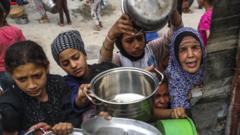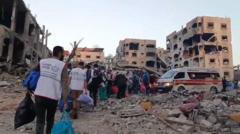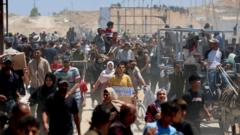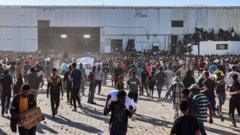As desperation mounts among residents in Gaza searching for food, reports indicate a significant breakdown in order, with violence erupting at aid distribution sites and escalating Israeli military actions.**
Chaos Unleashed as Aid Efforts Falter in Gaza Amid Desperate Search for Food**
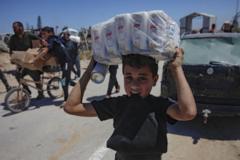
Chaos Unleashed as Aid Efforts Falter in Gaza Amid Desperate Search for Food**
Security collapses in Gaza as looting escalates and aid remains inaccessible for the needy.**
In the heart of Gaza's largest city, a pervasive sense of chaos prevails as thousands of desperate residents confront escalating food shortages exacerbated by an ongoing blockade. Looting incidents have surged, severely undermining local security amidst increasing violence. The Hamas-controlled interior ministry reported the tragic deaths of seven police officers on Thursday, killed by an Israeli air strike while attempting to manage a chaotic market scene overwhelmed by desperate citizens. Though the Israeli military has not issued specific comments regarding the incident, it reported numerous attacks targeting what it labels “terrorist infrastructure” across Gaza.
Witness reports suggest a troubling escalation in violence, alleging that at least 44 people died during clashes and airstrikes on Thursday, many of whom were innocents caught in the crossfire. Distressing scenes unfolded when the United Nations' World Food Programme conveyed that two individuals were shot during a surge of hungry residents clamoring for provisions at its warehouse in Deir al-Balah. Scuffles erupted as crowds overwhelmed a newly established food distribution center run by the US-backed Gaza Humanitarian Foundation (GHF), leaving several injured.
Scenes from Gaza City depict police officers wielding firearms trying to restore some semblance of order, only to be met with lethal force. The Hamas-run interior ministry condemned these strikes as a continuation of what they call “systematic massacres.” Meanwhile, the Israeli military asserts their operations target those alleged to be connected with Hamas, emphasizing that their aerial assaults include strikes on armed positions and terror sites deemed threatening to Israeli defense forces.
Furthermore, local reports indicate widespread lawlessness, with many families reporting challenges in accessing even basic supplies. A witness shared harrowing accounts of the distribution process being disrupted as thousands broke through barriers, leading to chaotic scuffles as the urgency for aid reached a peak. Strikingly, while the GHF announced the distribution of food boxes involving nearly a million meals, the on-ground realities showcased significant disparities as countless individuals returned empty-handed in the face of dire hunger.
Local sentiments reveal growing frustration over the inequitable aid management, particularly impacting the most vulnerable populations. Interviews with the elderly and struggling families highlighted the harsh reality of competition for resources among a desperate crowd, further fuelling a sense of collective disenfranchisement and humiliation.
Amidst the turmoil, plans are afoot to enhance the GHF's distribution capabilities, as it strives to set up more sites to cater to the growing humanitarian needs, despite associated controversies. The Israeli blockade, which resumed earlier this month, continues to impose severe restrictions on humanitarian activities in Gaza, igniting discussions regarding the plight of hostages and ceasefire proposals.
In the backdrop of this unfolding crisis, the international community observes grave human rights implications, with increasing calls for ethical humanitarian interventions. Meanwhile, any prospects for renewed peace discussions remain shrouded in uncertainty as negotiations persist through a cycle of violence and retaliation.
Witness reports suggest a troubling escalation in violence, alleging that at least 44 people died during clashes and airstrikes on Thursday, many of whom were innocents caught in the crossfire. Distressing scenes unfolded when the United Nations' World Food Programme conveyed that two individuals were shot during a surge of hungry residents clamoring for provisions at its warehouse in Deir al-Balah. Scuffles erupted as crowds overwhelmed a newly established food distribution center run by the US-backed Gaza Humanitarian Foundation (GHF), leaving several injured.
Scenes from Gaza City depict police officers wielding firearms trying to restore some semblance of order, only to be met with lethal force. The Hamas-run interior ministry condemned these strikes as a continuation of what they call “systematic massacres.” Meanwhile, the Israeli military asserts their operations target those alleged to be connected with Hamas, emphasizing that their aerial assaults include strikes on armed positions and terror sites deemed threatening to Israeli defense forces.
Furthermore, local reports indicate widespread lawlessness, with many families reporting challenges in accessing even basic supplies. A witness shared harrowing accounts of the distribution process being disrupted as thousands broke through barriers, leading to chaotic scuffles as the urgency for aid reached a peak. Strikingly, while the GHF announced the distribution of food boxes involving nearly a million meals, the on-ground realities showcased significant disparities as countless individuals returned empty-handed in the face of dire hunger.
Local sentiments reveal growing frustration over the inequitable aid management, particularly impacting the most vulnerable populations. Interviews with the elderly and struggling families highlighted the harsh reality of competition for resources among a desperate crowd, further fuelling a sense of collective disenfranchisement and humiliation.
Amidst the turmoil, plans are afoot to enhance the GHF's distribution capabilities, as it strives to set up more sites to cater to the growing humanitarian needs, despite associated controversies. The Israeli blockade, which resumed earlier this month, continues to impose severe restrictions on humanitarian activities in Gaza, igniting discussions regarding the plight of hostages and ceasefire proposals.
In the backdrop of this unfolding crisis, the international community observes grave human rights implications, with increasing calls for ethical humanitarian interventions. Meanwhile, any prospects for renewed peace discussions remain shrouded in uncertainty as negotiations persist through a cycle of violence and retaliation.


